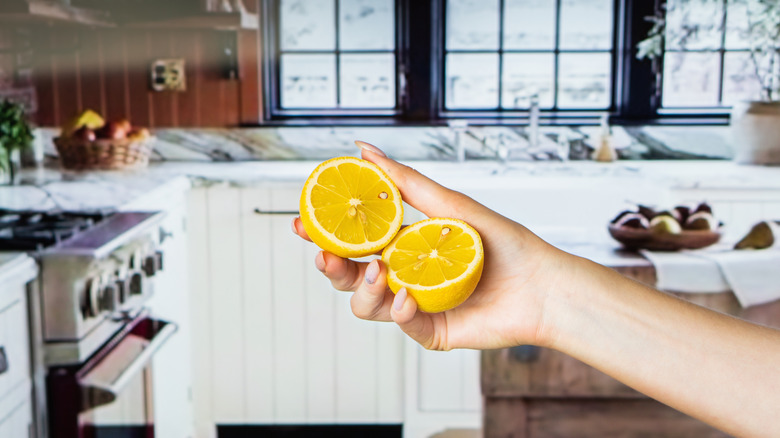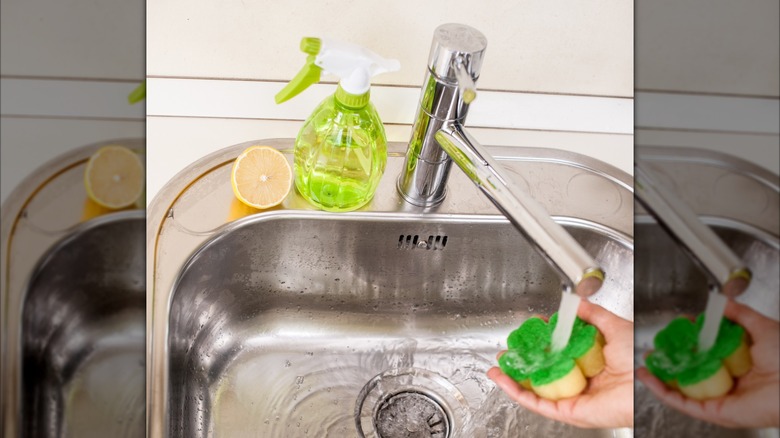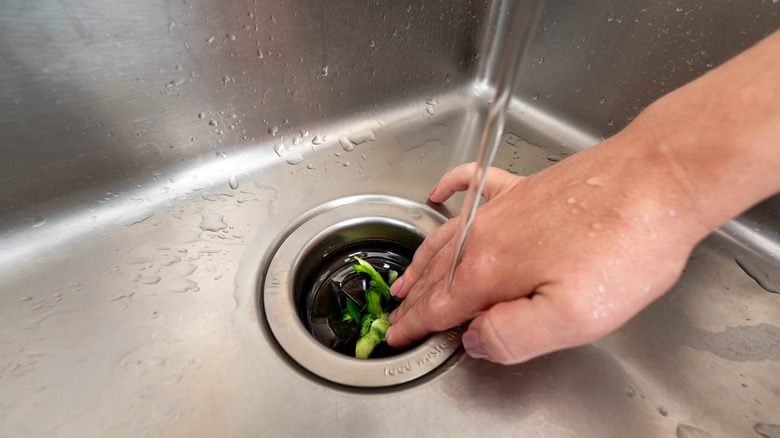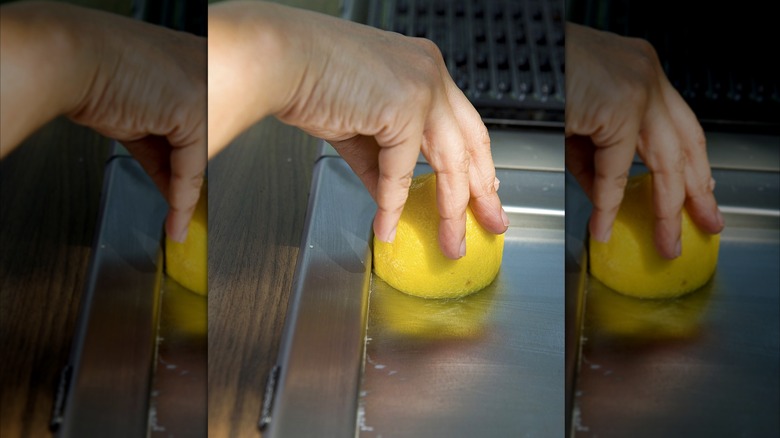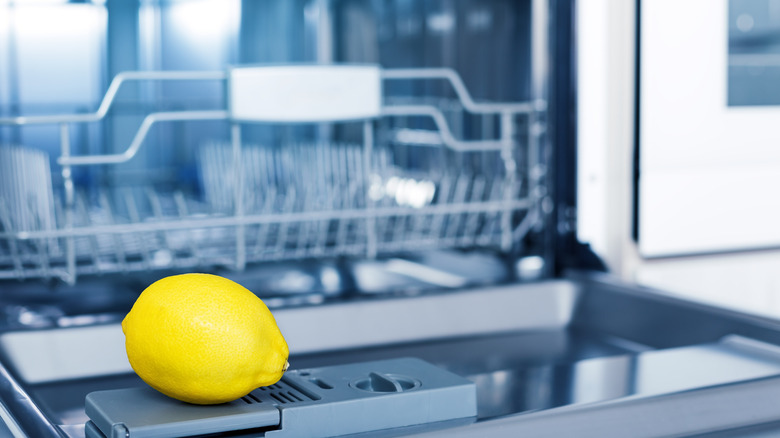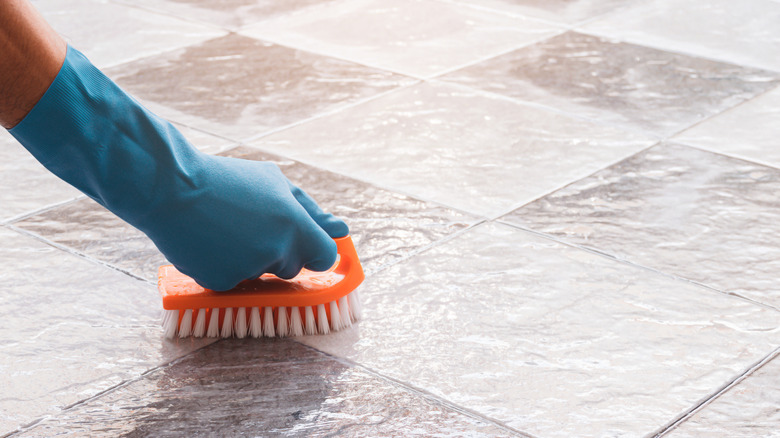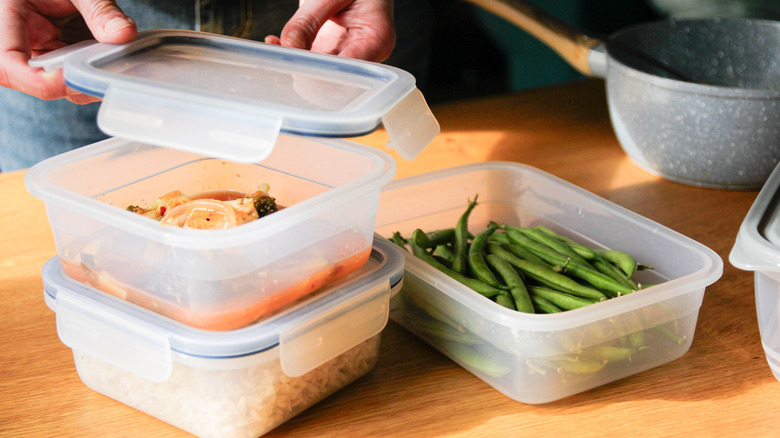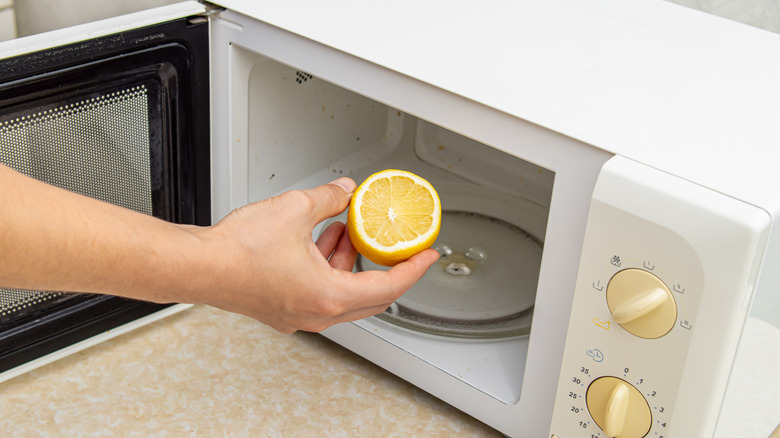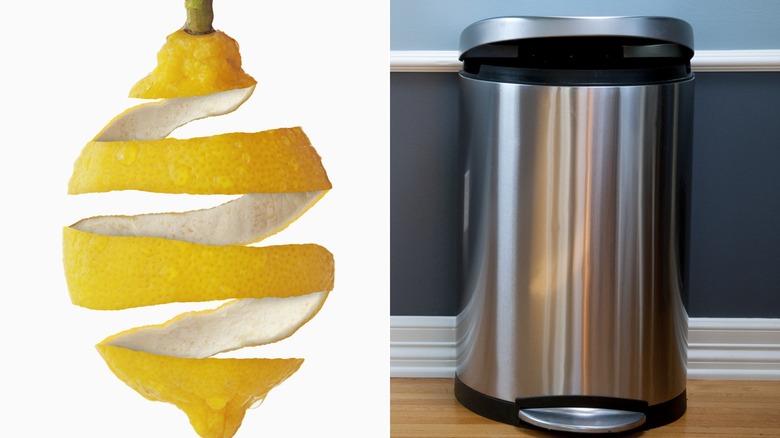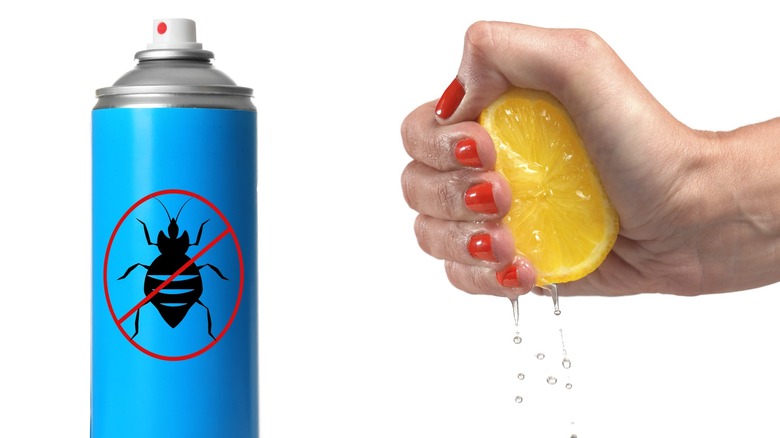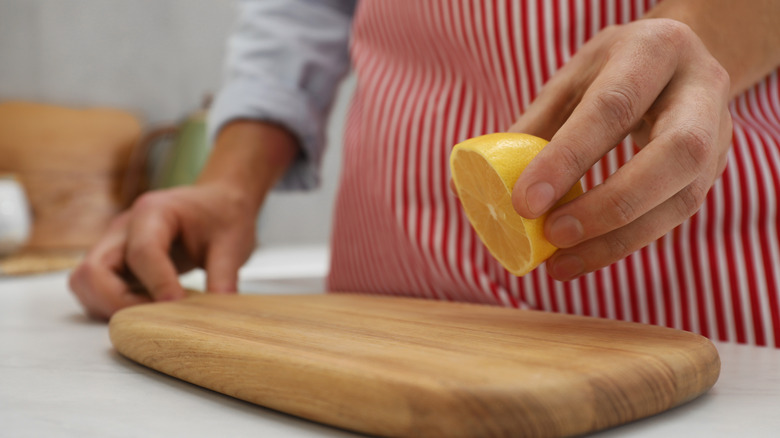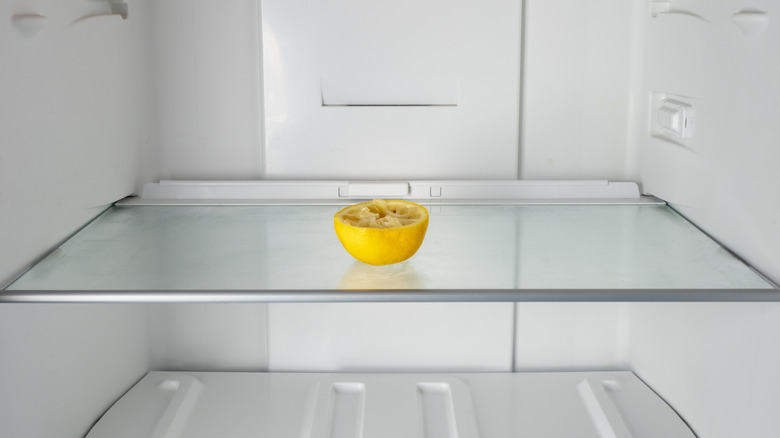12 Genius Ways To Clean Your Kitchen With Fresh Lemon
Many people are moving further away from traditional cleaning supplies — mainly scrubs or sprays that contain harmful chemicals. These products can cause health issues for the people in your home and can also affect the environment in a negative way. There are many great brands out there that sell natural cleaning products,but what you may not know is that you can also use ingredients that may already be in your kitchen.
Lemon is going to be your new secret weapon. Even though many of us only use it for various sweet and savory lemon recipes, you can also use fresh lemon to clean your kitchen in more ways than you might believe. Lemon contains citric acid, which can help remove stains and smells. It also cuts through grease and can kill many types of bacteria. Essentially, this is what many people try to achieve with products that contain harsh chemicals, but lemon turns out to be a safer and cheaper alternative. There are other ingredients that, when mixed with lemon, can create an even stronger cleaner. Things like salt, vinegar, and baking soda can be used in different ways, along with fresh lemon, to clean a large variety of things in your kitchen.
From cleaning surface stains to reducing unwanted odors — we've covered various ways to use fresh lemon to your advantage when cleaning your kitchen. So, make sure you're stocked up on a few fresh lemons, and let's get cleaning.
Clean stains in your kitchen sink
Nobody likes the unsightly view of stains stuck in your kitchen sink. No matter how much you scrub with your trusty dish soap and sponge, the stains remain. The best way to get these stains out once and for all is by using fresh lemons.
One method to clean your kitchen sink with lemon is by cutting a lemon into two halves. Then, grab some sea salt. Take one of the lemon halves and sprinkle a generous amount of sea salt on the open side. Hold the lemon by the peel, and go ahead and scrub it all over the stains in the sink. The salt will help to really cut through the stains while the acid penetrates deeper to completely remove it.
Another option is to create a salt and lemon juice paste simply by spreading a few tablespoons of salt on a plate and squeezing the lemon over it until a paste-like texture appears. You can spread the paste onto the stains in the sink and let it sit for about 15-20 minutes. Then, scrub it away with a sponge. Both of these methods will leave your sink shiny, clean, and stain-free. It also helps with the overall smell, as it leaves a natural lemony aroma.
Freshen up your garbage disposal
While on the topic of freshening up your sink, you don't want to forget about the garbage disposal. It's not a self-cleaning appliance, and with so much food going down it on a daily basis — there's bound to be some residue.
If your garbage disposal has an extremely pleasant odor, you're going to want to do a deep clean. To do this, you'll need baking soda, white vinegar, ice cubes, dish soap, an old toothbrush, and of course — a lemon. First, pour a generous amount of baking soda straight into the drain. Then, pour some vinegar on top. It'll start to bubble, creating a chemical reaction that helps to break through any stuck leftovers and residue. Then, you can take your old tooth brush and scrub deep into the drain. The lemon comes in next. You need to cut a lemon into multiple wedges and place two or three wedges into the garbage disposal along with a handful of ice. Push it down, and then turn on the disposal. This will help to sharpen the blades and completely remove any unpleasant odor.
If your sink doesn't have an extreme amount of accrued build-up, or you clean it regularly, you can also use lemons as a weekly maintenance. For this, take a couple of wedges of lemon and, together with water, shred it through the disposal. If you do this once a week, your garbage disposal will always smell nice and fresh.
Scrub spots away on a stainless steel stove and pans
It's important to keep your stainless steel appliances nice and clean, but many people have trouble doing so. Without spending extra money on cleaning supplies made specifically for stainless steel, you can use fresh lemon to get the sparkly clean look that everyone strives for.
One of the most troublesome appliances to clean is a stainless steel stove. With so much food residue that clings to the surface, and stubborn stains that are bound to appear, it can be a bit frustrating. However, all you need to clean it is a lemon and baking soda. Cut your lemon in half and top with a heap of baking soda. Squeeze the lemon so that the juices are released and scrub down your stove. The acid from the lemon and exfoliating properties of the baking soda will help to break down any rust or stains. Once that's scrubbed, you should wipe it down with a damp cloth to remove the excess. Lastly, dry it with a towel.
You can also use lemon for other stainless steel items in your kitchen, like the front of a refrigerator or stainless steel pans. Take a lemon half, and rub it straight onto the surface that you want to clean. Then, wash it off with water. Remember that while lemon might be great for some materials, you should never use it to clean stoneware.
Refresh your dishwasher
Nothing is worse than running a full dishwasher, going to put away the dishes, and realizing that there is a slightly unpleasant smell coming from inside the machine. Over time, dishwashers tend to collect tiny pieces of food in various places that can ooze a musty smell. No amount of detergent will get rid of it, and when it gets to that point, it's time to call in the reinforcement.
Using lemon is the best way to combat any type of unusual odor in your dishwasher. Do this by placing half of a lemon face down on the top rack of your dishwasher. You can follow the method with a full dishwasher, and the dishes will come out smelling nice and fresh. Once it's emptied, the machine will also lose the unwanted stale smell.
Some people use this method with every washing cycle as a great way to maintain the freshness of your dishwasher. Along with that, it can also make the dishes shinier. It should be noted that you need to make sure to remove any seeds in your lemons before placing them in the dishwasher. If you want a freshness overload, you can use more lemon pieces. Some people even use up to three whole lemons in their dishwasher!
Clean the glass on your windows
Instead of spending your money on a cleaner that is specifically made for cleaning windows (one that possibly contains harmful chemicals), you can make your own window spray at home. Windows don't typically call for a deep clean scrub, so making a homemade version is a great way to substitute a potentially harmful product for something more natural. To do this, you'll need an empty spray bottle, white vinegar, two lemons, and water.
Squeeze the juice from two lemons into a bowl or cup and transfer it into your spray bottle. Then, add enough vinegar to fill about two thirds of your spray bottle and top up the rest with hot water. Shake the spray bottle, and you're good to go. The mixture of vinegar and lemons helps to cut through any sort of grease on the windows, while the lemon also adds a pleasant scent that will help your kitchen smell clean and fresh.
Whiten the grout of your kitchen floor or backsplash
One of the most tedious things to clean in any kitchen is the grout on the floor or on the backsplash. White grout starts to get dirty over time, especially in an area like the kitchen that sees a lot of traffic and where food and grease particles stick to surfaces. To clean the grout you don't need any sort of fancy cleaner to get the job done. All you need is lemon juice.
If your grout just needs a quick maintenance cleaning, the process is fairly simple. Squeeze the juice out of a fresh lemon or two into a cup. Then, spread the lemon juice straight onto the grout. You can let it soak for about 10 minutes and then wipe it off with a damp cloth. This will help to brighten up the white color while also adding a pleasant scent.
If it's been some time since you've cleaned your grout, you're going to want to opt for a deeper clean. To do this, you can make a simple paste with lemon juice and baking soda. Smear the paste onto the grout and leave it for about five to ten minutes. After that, take an old toothbrush or a grout cleaner and scrub the paste into the grout. This will help to break through any dirt or residue that's stuck in the crevices. Wipe clean with a damp cloth, and you'll end up with a sparkly clean grout.
Eliminate the smells in your food containers
If you've ever thrown away plastic food containers because they have questionable odor stuck inside — you're not alone. However, that is not only a waste of money, but it's also harmful to the environment. Plastic food containers were created to create less waste, so it's important to keep them clean and fresh so that they can be used for longer.
The combination of soap and water doesn't always get the smell of food completely out of food containers, and that's when you need to get a little bit creative. One way to do this is by pouring some lemon juice into the container. Swirl the juice around until it covers the entire interior and sprinkle baking soda over it so it sticks. Let it sit for 10 to 15 minutes, then scrub with a sponge and rinse well with warm water. This will help remove any odors that were stuck, and it will also help to remove discoloration.
If the container isn't extremely stained or foul, you can use a simpler method as a way to maintain the freshness. Simply clean your container as usual, and rinse with hot water. Then, take a lemon half and rub it inside the container. Rinse with hot water again, and you're good to go.
Freshen up your microwave
Similar to the dishwasher, a microwave can become a universe of its own when it comes to funky aromas. From vegetables and pasta sauces to meats and beyond, the collection of various smells can turn out to be quite unpleasant. However, you don't need to be holding your breath every single time you open the microwave door. Using lemon is an easy way to combat the problem and clean the microwave.
You want to start by filling up a mug with water and a few lemon peels. Then, microwave it for a few minutes until the water boils. The peels of any citrus fruit can help get rid of lingering odors, but the freshness of a lemon will also deliver a particularly pleasant aroma. Another method is to place an entire lemon half straight into the microwave. You can microwave it for a couple of minutes, and then keep the microwave closed — allowing the steam to cover all areas of the microwave. This will help take down any stubborn grease or food residue, along with the accompanying odor. After it has sat for a bit, you can wipe down your microwave with a damp cloth to remove any residue.
Use the entire lemon to keep your garbage can smelling fresh
Have you ever noticed that your garbage was particularly smelly, and even after taking it out, you came back to find the smell lingering for hours? It can be incredibly frustrating, but it can also be avoided. Besides doing the classic cleaning of your garbage can every so often, there are other methods to use that can keep the garbage can smelling fresh on a daily basis.
For deep cleaning, you can use a mixture of lemon, vinegar, and baking soda to wipe down the garbage can. This will cut through any food residue that is stuck, and will leave your garbage can smelling incredibly fresh. Now, for weekly garbage can maintenance, we have an easy hack that'll ban any stubborn smells from existence. You may have heard of sprinkling baking soda into the bottom of your trash can, but have you heard of placing lemon peels on top of it? The combination of baking soda and lemon peels helps to naturally absorb bad smells. Additionally, lemon will emit pleasant citrusy aromas.
Keep away pests with a lemon juice spray
Nobody wants to experience the unpleasant surprise of a roach jumping out of your kitchen sink drain or mosquitoes sneaking through the windows during the summer. Though insect repellents are the means how to prevent these incidents, many people don't want to use them as they can be harmful to household pets, and they are not so great for humans, either.
The good news is that you can make a completely natural home remedy that will keep these unwanted visitors away. Bugs like ants, cockroaches, water bugs, spiders, and mosquitoes are sensitive to certain smells — and lemon is one of them. They don't like the smell, so if they sense it, they will stay away. To use this to your advantage, you can make a mixture of fresh lemon juice and water. Place the mixture into a spray bottle and use it to spray surfaces like windowsills, baseboards, kitchen sinks, and other areas where you've noticed pests.
This method will not only get rid of the use of unnecessary chemicals inside your home, but it will also leave a pleasant aroma — doubling as an air freshener. So, take this as a two in on. Keep pests out and enjoy the refreshing citrus fragrance.
Clean your wooden cutting board
Wooden cutting boards tend to get small cuts and cracks on them after many uses. Though you may clean your board after each use, there is still going to be a build up of bacteria and food that gets stuck. It can even start to develop an unpleasant odor, which is definitely not ideal.
You can sanitize your wooden board with vinegar, but to get it extremely clean, you can just use a lemon and some salt. Cut the lemon in half, and sprinkle a good amount of salt across the cutting board. Then, scrub your cutting board with the open side facing down. The citric acid in the lemon can help you eliminate some bacteria, while the salt acts as an abrasive to allow the acid to penetrate deeper. After you scrub, let the lemon and salt mixture sit on the cutting board for several minutes. Rinse with warm water, letting all the residue you pulled out with the scrub to wash away. Your cutting board will thoroughly cleaned and will smell great as well.
Keep your fridge smelling fresh
We couldn't possibly ignore one of the most important appliances in the kitchen — the refrigerator. Even if you regularly clean out spoiled food from the fridge, and wipe it down every so often, it can still get the distinctive musty odor. To prevent this, rely on lemon and its amazing properties.
To do this, you can cut a few lemons into slices or halves and place them throughout different sections of your fridge. Don't forget the doors, the veggie compartments, or the cheese drawer. Fresh lemon neutralizes any strange, lingering smells that are overtaking the refrigerator. Some people also like to sprinkle a bit of baking soda on top of the lemon as well, to help with the absorption. You can keep the lemon halves in there for a maximum of six days – and you will notice a change in the smell after just a couple of hours.
